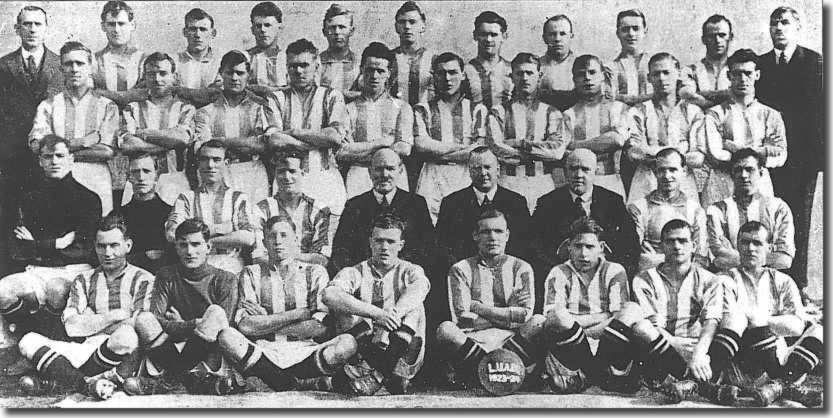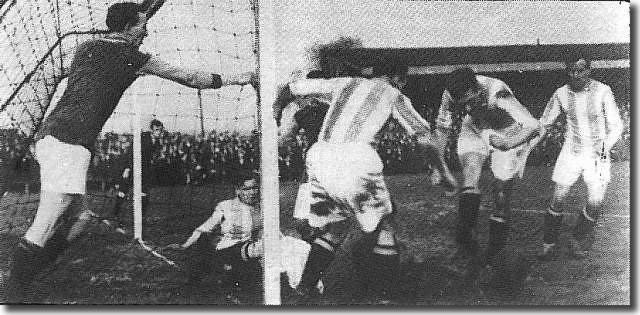 The
previous two seasons had been promising ones for Arthur
Fairclough and his Leeds United team, and there was a great deal of
optimism around Elland Road as their fourth season in the Second Division
dawned. They had been just four points off promotion the previous season.
The
previous two seasons had been promising ones for Arthur
Fairclough and his Leeds United team, and there was a great deal of
optimism around Elland Road as their fourth season in the Second Division
dawned. They had been just four points off promotion the previous season.
The resignation of assistant manager Dick
Ray during the summer was shrugged off as Fairclough enlisted the
support of Dick Norman, the Blackpool manager, to replace him. The two
had worked together previously when Fairclough had been at Barnsley before
the First World War and knew each other well.
In the summer there had been something of a clear out of fringe players,
with half-backs Alf Dark and Jimmy Walton, forwards Len Armitage and George
Mason and full-back Joe Potts all leaving while former Leeds City winger
Ivan Sharpe retired.
The only recruits were forward Bob Fullam, centre-half Lawrie Baker,
keeper Bill Johnson and left-back George Speak. Of these, only Speak played
any real part in the team in 1923/24, filling the left-ack position in
around half the games. Bill Menzies captured the shirt for much of the
run in, however, and became a fixture at No 3 for the next few years.
Much of the previous year's promising side was still around, but now
Billy Down had regained the goalkeeper's jersey from Fred Whalley and
young Joe Richmond secured the No 9 shirt for most of the season. The
stalwarts Bert Duffield, Ernie Hart and skipper Jim Baker ensured the
defensive stability continued as the goals against total achieved a record
low for a third successive season, but now the forward line had become
equally effective. Alan Noble and Joe Harris were the providers from the
wings, but the real strength lay in the other three, Richmond, Percy Whipp
and Jack Swan, who between them hit 44 of United's 61 goals in the league.
At last Fairclough had finally brought together an outfit that were uniformly
good and that he could be satisfied with. Despite an inauspicious start,
with just one win from the first six games, by November Leeds had surged
to the top of the table with a dazzling streak of results that included
seven successive victories. They faltered in December, losing twice to
promotion rivals Bury, but on Boxing Day recovered enough to thrash Oldham
5-0 at Elland Road with goals from Swan (2), Richmond and Whipp(2). The
Yorkshire Post celebrated 'a fine exhibition of aggressive play
... Leeds would not have been flattered if they'd doubled the score. They
had a very effective left wing in Armand and Swan whose perfect combinations
went a very long way to securing this victory.'
Two early defeats had come at the hands of Leicester City. The Midlands
club had been unlucky to miss out on promotion the previous season when
they had finished third but only on the basis of an inferior goal average
to runners up West Ham. They were still a strong test for any team, although
they slumped badly to a final position in the middle of the table.
After their shaky spell during December, Leeds United came back strongly.
Six straight wins from January to March kept Leeds buoyant. Yet, despite
being on the threshold of the first division, home attendances were dispiritingly
low: only 11,000 saw the 3-1 home victory over Coventry on 9 February;
just 8,000 the midweek 2-1 win against South Shields on 27 February. Leeds
United were about to make history, but Elland Road, when only a quarter
full, was a downbeat arena; its pulse rate low. The team, however, was
full of fight and fire.
back to top
Leeds were now sitting pretty at the top of the division and even the
customary Cup exit, 3-0 at the hands of First Division giants Aston Villa
in front of nearly 52,000 fans in Birmingham, could not deter them.
That match was in the third round, which was as far as either City or
United had ever got, and matched their progress the previous year.
They faltered quite badly in the last couple of months of the season,
winning just twice in the last eight games and it looked like  they
might have shot their bolt when four straight draws were followed by a
2-0 defeat at promotion rivals Derby. However, on 21 April the football
team of Leeds finally achieved their long cherished goal of promotion
to Division One by beating Stockport 4-0 at Elland Road and for once there
was a sense of occasion. 'The holiday crowd, officially returned at 22,145,
was more demonstrative than perhaps any that has been assembled in this
ground since the War,' reported the Yorkshire Post. 'Though cleverer
teams have won promotion, no set of players has tried harder or trained
more conscientiously. The extraordinary tenacity of the home players and
their effective tackling was too much for Stockport in the second half.'
Jack Swan struck two of the goals.
they
might have shot their bolt when four straight draws were followed by a
2-0 defeat at promotion rivals Derby. However, on 21 April the football
team of Leeds finally achieved their long cherished goal of promotion
to Division One by beating Stockport 4-0 at Elland Road and for once there
was a sense of occasion. 'The holiday crowd, officially returned at 22,145,
was more demonstrative than perhaps any that has been assembled in this
ground since the War,' reported the Yorkshire Post. 'Though cleverer
teams have won promotion, no set of players has tried harder or trained
more conscientiously. The extraordinary tenacity of the home players and
their effective tackling was too much for Stockport in the second half.'
Jack Swan struck two of the goals.
That set things up nicely for the home
game with Nelson Town on 26 April. A 1-0 victory secured the Second
Division title and the crowd poured onto the pitch at the final whistle
to celebrate their success. Leeds lost the return game at Nelson a week
later by 3-1, but it was too late to make a difference and they won the
title with 54 points, going up with second placed Bury who finished level
on 51 points with Derby.
Manager Arthur Fairclough and his players were branded miracle workers
in the city of Leeds and feted wherever they went. The unofficial championship
win during the year had been important, but now official glory was conferred
upon Leeds United and the Yorkshire public revelled in the triumph.
Other Football Highlights from 1923/24
- After the closest battle ever for the title, Huddersfield Town emerged
victorious over Cardiff on goal average by 0.024 of a goal to secure
their first league championship. Huddersfield's goals record read 60-33,
while the Welsh club's finished 61-34. As the teams entered the last
match, Town were a point behind, but they beat Forest 3-0 at Leeds Road,
while Cardiff missed a penalty as they had to settle for a goalless
draw at Birmingham
- Wembley proved a happier hunting ground than Crystal Palace for Newcastle
in the Cup. They had lost five of their six finals at Palace, but in
their first visit to Wembley they scored two goals in the last seven
minutes to win the 1924 FA Cup against Aston Villa
- Future Leeds manager Billy Hampson
became the oldest finalist this century at 41 years 8 months when he
played right-back for Newcastle, but Billy Meredith became the oldest
man to play in the FA Cup when, at the age of 49 years and eight months,
he took the field for Manchester City against the Geordies in the semi-finals
- Wales won all three Home International games to win the title outright
for the second time in five seasons
- England played their first match at Wembley, drawing 1-1 with Scotland
to earn their only point in the championship












 The
previous two seasons had been promising ones for Arthur
Fairclough and his Leeds United team, and there was a great deal of
optimism around Elland Road as their fourth season in the Second Division
dawned. They had been just four points off promotion the previous season.
The
previous two seasons had been promising ones for Arthur
Fairclough and his Leeds United team, and there was a great deal of
optimism around Elland Road as their fourth season in the Second Division
dawned. They had been just four points off promotion the previous season. they
might have shot their bolt when four straight draws were followed by a
2-0 defeat at promotion rivals Derby. However, on 21 April the football
team of Leeds finally achieved their long cherished goal of promotion
to Division One by beating Stockport 4-0 at Elland Road and for once there
was a sense of occasion. 'The holiday crowd, officially returned at 22,145,
was more demonstrative than perhaps any that has been assembled in this
ground since the War,' reported the Yorkshire Post. 'Though cleverer
teams have won promotion, no set of players has tried harder or trained
more conscientiously. The extraordinary tenacity of the home players and
their effective tackling was too much for Stockport in the second half.'
Jack Swan struck two of the goals.
they
might have shot their bolt when four straight draws were followed by a
2-0 defeat at promotion rivals Derby. However, on 21 April the football
team of Leeds finally achieved their long cherished goal of promotion
to Division One by beating Stockport 4-0 at Elland Road and for once there
was a sense of occasion. 'The holiday crowd, officially returned at 22,145,
was more demonstrative than perhaps any that has been assembled in this
ground since the War,' reported the Yorkshire Post. 'Though cleverer
teams have won promotion, no set of players has tried harder or trained
more conscientiously. The extraordinary tenacity of the home players and
their effective tackling was too much for Stockport in the second half.'
Jack Swan struck two of the goals.